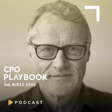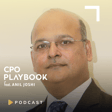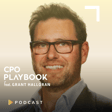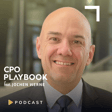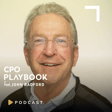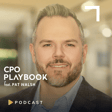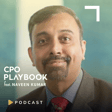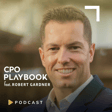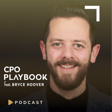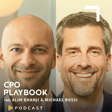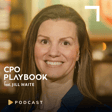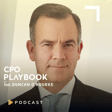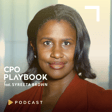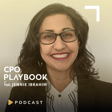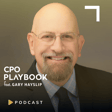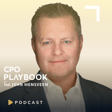Introduction to CPO Playbook and Business Challenges
00:00:01
Speaker
I'm Felicia Shakiba, and this is CPO Playbook, where we solve a business challenge in every episode.
Challenges of Organizational Silos and Adaptability
00:00:14
Speaker
organizational silos. They have always been there, yet have recently emerged as a progressively escalating concern, replete with harsh implications. Recent statistics reveal that a staggering 89% of employees feel that silos exist within their organization, obstructing effective communication and collaboration. These isolated pockets within a company can lead to a significant loss in productivity
00:00:42
Speaker
affecting overall business performance. In today's digital age, where innovation and adaptability are paramount, the impact of silos on business is far more profound. The modern business environment demands rapid information exchange, cross-functional teamwork and a holistic view of the market.
00:01:01
Speaker
The inability to break down these barriers can jeopardize the company's competitiveness and growth.
Ashaki Rucker on Silos in Organizations
00:01:08
Speaker
Exploring solutions with me today is Ashaki Rucker, SVP of Human Resources for NBC Universal's Telemundo Enterprises and Latin America and Board of Directors of Amaranth Bank. Ashaki, welcome to the show. It's great to have you here today.
00:01:28
Speaker
Thank you, Felicia. It's a pleasure to be here. Thanks for having me. Ashaki, what was the business experiencing as symptoms of organizational silos?
00:01:39
Speaker
I feel like the primary drivers that I've experienced over the course of the last 20 years, particularly in the media and entertainment industry, have been the rapid evolution of technology. So what we've been finding is that the introduction of new content consumption platforms really continues to create a natural tension within the business as you're transitioning from one
00:02:08
Speaker
technology to the next.
Misalignment and Collaboration Issues
00:02:10
Speaker
So for instance, at the Walt Disney Company, we were transitioning from physical Blu-ray content distribution to digital content distribution. So that naturally created a tension between the present and the future. And we're now having a similar experience as it relates to linear content and streaming.
00:02:38
Speaker
So what you find is that as that technology continues to evolve, leaders in different pockets of the organization that have ownership of the different platforms or technology at any given time tend to sometimes shy away from collaborating
00:02:58
Speaker
given what they feel is the impact to them in their role at any given time. So it's been interesting to watch how that push in technology and how rapidly the technology changes continues to drive behaviors within an organization.
00:03:16
Speaker
Yeah, when I think about organizational silos, there is a lot of tension between different functions, different functional heads, miscommunication, misalignment on vision and mission. And I think about all these things about what is that
Strategies for Effective Collaboration
00:03:33
Speaker
impact. And when you talk about these technological changes or advances, and obviously the world is going through that today, I could only imagine how much it might exacerbate that type of situation.
00:03:46
Speaker
Yeah, it's been just very interesting to watch. And even when executives seem to be aligned around strategy, behaviors don't always match the verbal acknowledgement that, hey, we're all in alignment and we need to be growing in the same direction. So HR and finance in particular, I think have a
00:04:10
Speaker
tend to just organically have a bird's eye view of the organization. So we always get a window into how executives are either collaborating effectively or continuing to work in silos. So it's quite interesting to watch.
00:04:26
Speaker
I can relate. So what strategies have you found most effective in breaking down silos and really fostering that cross-functional collaboration within a large organization?
00:04:41
Speaker
I mean, there are several things. Just to be honest and candid and frank, I don't know that there's one size fits all, right? I think the first thing that comes to mind is really strong leadership. Strong leadership, I think, drives most things in organizations. So if you have a strong leader sitting at the helm of an organization that is pretty clear and consistent around their desire for their leadership team and each leader's respective teams to work effectively together,
00:05:11
Speaker
I think it starts there. So where I've seen leaders strongly encourage their executives to come together to strategize when the strategy needs to cut across teams, particularly in the content space. We're always watching how content is moving across the different platforms throughout its life cycle. You need leaders to come together to provide input, ideas, and clarity around how that strategy is going to come together.
00:05:41
Speaker
If that's not happening, the executive sitting at the helm of the organization really needs to continue to encourage and foster and facilitate those behaviors. So that's the first thing. I think it starts with leadership and consistency from a leadership standpoint.
00:05:59
Speaker
because if a leader sends inconsistent messages in an organization where it's already a challenge, then it all falls apart. So that's the first thing. I think then secondarily, there's obviously incentives. It's interesting with incentives because I think there's a lot of data that has shown that
00:06:17
Speaker
money is not always the biggest driver of behaviors, but it certainly is one horn lever that can be pulled at any time. So I personally have worked with leaders on looking at how do we leverage
00:06:33
Speaker
either annual incentive plans, so bonuses, annual bonuses, and or quarterly bonuses. I've actually supported sales organizations where cross
Impact of Leadership Changes
00:06:43
Speaker
-selling is really critical to drive behaviors and giving people clarity on the front end that as an executive in partnership with HR, we're going to be taking into account
00:06:56
Speaker
what behaviors were demonstrated as it relates to collaboration throughout the year when making incentive decisions. That has actually been very, very successful in organizations because those leaders that aren't naturally inclined to demonstrate collaborative behaviors, I think will think a little bit more, they'll be more thoughtful about their behaviors throughout the year to drive the payout that they're looking for.
00:07:23
Speaker
And then the other one I think is back to basics, which is really recognition programs, right? I think another part of the toolkit. So if you have a nice combination of strong leadership, clear messages, role modeling, facilitating behaviors, incentive programs that clearly indicate on the front end with no surprises that collaboration is going to be taken into account.
00:07:45
Speaker
and then meld and integrate recognition programs in there. I've seen organizations do very formal recognition programs, but I don't think that that's always necessary. It depends on the culture of the organizations. And recognition is interesting because it can vary so greatly from a leader to leader or person to person in terms of how people like to be recognized, I will say.
00:08:10
Speaker
But it's still very effective in terms of a leader being really clear on who in an organization, whether individual or team, is demonstrating the kinds of collaborative behaviors and then, most importantly, what the impact of those behaviors are on the organization.
Key Competencies for Leadership
00:08:30
Speaker
So when leaders are very intentional about that, whether it's in meetings and one-on-ones and performance reviews and emails, I mean, however one executive chooses to, I think that can be very effective. So I think the suite of those approaches can work really well depending upon the context that you're working within, because context is always important.
00:08:53
Speaker
Absolutely. Yeah. Just like a triple threat strategy. Exactly. Right. Because there's typically not a one size fits all approach that will work. Could you share a specific success story where you might have witnessed the dismantling of a silo significantly impact the company's performance or innovation? And what were the key factors in that success?
00:09:20
Speaker
This is an interesting question because to be candid and frank, breaking down silos is a journey. I'll say that is the first thing I'll say. I feel like it's a journey in organizations and is quite challenging as well, depending upon the dynamics in an organization. So when I think examples, it's somewhat challenging because there usually isn't a sort of start and stop and result. However, what I will say,
00:09:48
Speaker
that I've seen that has worked extremely well, which actually I didn't touch on on the prior question is sometimes making leadership changes have a really significant impact. And that's what I have seen. I've seen leaders and organizations who just have a
00:10:05
Speaker
consistent lean towards working in a silo despite being provided clear guidance and instruction around the desire to have the team working as a collective. And there is a point where a chairman or president might need to say, hey, perhaps
Role of Data in Media Collaboration
00:10:23
Speaker
this is not the right role for you and or worst case scenario, this might not be the right organization for you.
00:10:30
Speaker
in that example that is coming to mind for me, that had a really significant impact because at the senior leadership level, if you are not role modeling behaviors for your team, that has a trickle down effect through the organization. So the chairman
00:10:46
Speaker
I think providing a few clear warnings and then making a significant leadership change had a significant impact on the organization being able to work together effectively. Because if you have someone sitting at the helm that is not encouraging or in some instances is even blocking communication and collaboration,
00:11:08
Speaker
that can have a really significant impact. So that's not always easy for executives to do, right? Depending upon the dynamic, the relationships in an organization, even sometimes what that leader is contributing to an organization, because there are times when a leader is contributing so significantly to the organization, but how they're doing it is so detrimental to the organization
00:11:35
Speaker
that it's very difficult to back into the decision to transition a leader out of their role or ultimately out of the organization. But when you have an executive who has enough courage to make those decisions and make those moves because the impact of the siloed behavior is so detrimental, I think that it sends such a strong signal and message to the organization about how important collaboration and working together and bringing
00:12:03
Speaker
the best of the entire organization forward is for the organization's overall success. So that's probably one of the best examples. And then another is where compensation and incentives have been leveraged, frankly. I think when I was at the Walt Disney Company, I partnered with an executive and we
00:12:21
Speaker
We wanted to focus on organizational values, overall collaboration being one of the values, not the sole value, but we communicated to the team that we would be looking at how people had demonstrated the values in addition to what they accomplished. So the what and the how.
00:12:37
Speaker
We even had language around it. We named it the sphere of success. So these are the behaviors that we feel are demonstrated within the sphere of success. And when someone wasn't demonstrating those behaviors too, we had language. So we would say,
00:12:52
Speaker
Oh wait, that behavior was outside of the sphere of success. Why don't you go have a conversation with that person? So that always having language also was extremely helpful for people to even approach the conversation because it sort of softened it a bit because we all had a consistent language that meant that we were all on the same page around what we were ultimately trying to achieve from a culture standpoint.
00:13:17
Speaker
So that's another example that I thought worked really well in terms of something that you can embed organically into the organization that worked really well.
00:13:27
Speaker
Oh, I like that a lot. A sphere of success. It just sounds great. And so let's dig in to that, right? A sphere of success and maybe perhaps share what specific leadership competencies or attributes that you believe are essential for driving a culture of collaboration and really breaking down silos.
00:13:51
Speaker
I think about that in the current context. The first competency I think is strategic agility. That's the first thing that comes to mind, frankly, is the ability to adjust for what the organization needs strategically at any given moment. As technology continues to rapidly impact the business,
00:14:11
Speaker
You need leaders that can make the adjustments in a timely fashion and pull in the right players to adjust and flex strategy as needed. So that's the first one hands down. If you're not comfortable with ongoing change and you don't have
00:14:31
Speaker
the ability to demonstrate the appetite, frankly, for ongoing change and being able to make that shift to strategy on a dime. I think you're going to be extremely challenged, at least in the current environment that we are operating in from a media and entertainment standpoint, because the market is so, so challenged now that we need people who can shift
00:14:52
Speaker
on a dime. And I think that strategic agility lends itself to also developing other strong leaders because you're essentially role modeling the
Evaluating Collaboration Success through Performance
00:15:03
Speaker
way, right? You're role modeling the way as it relates to what core behaviors are necessary for success in the organization and sending
00:15:13
Speaker
either great signals or not so great signals. So the strategic agility, the ability to develop other strong leaders. And then I think emotional intelligence, frankly, comes very much into play as well. Having the ability to tap into what is needed from an organizational standpoint, but also from an individual standpoint too, as the organization is rapidly evolving and bringing people along
00:15:41
Speaker
with you through change? Because again, I feel like change is always at the root cause of where silos tend to happen. I think those leaders who can tap into, okay, what is the org need? What is the team need? What is the individual need and build culture around that are going to be the most
00:16:02
Speaker
successful creating that sphere of success. That model was older, but if I think about it in the current context, those are the things that I typically think about when I'm thinking about, okay, who are the leaders for the future who we know are gonna drive the collaboration that we need? It's like, okay, strategic ability, can they role model and develop other strong leaders? And do they have the emotional intelligence to sort of tap into the myriad of needs at any given moment from an organizational standpoint?
00:16:31
Speaker
So those are the core that jump out for me as I think about those core leadership competencies. And I can imagine, I really love the fact that you shared strategic agility. I feel like silos get created when the strategy is misaligned between functions and department heads.
00:16:54
Speaker
And that strategic agility, if a leader or executive knows how to do that well, there's no doubt that those functions need to come together in order to pursue the same North Star, if you will. So I think that was a really key point. And then the other two competencies, you mentioned emotional intelligence and developing other strong leaders and emotional intelligence.
00:17:19
Speaker
I think go hand in hand just in an executive role overall to be successful. And so ensuring that development comes from a point of, Hey, here's where you need to like collaborate or bring people along your journey as a functional head or whatnot, I think is really, really key and critical there. So I think that those are really important. How do you perceive the role of technology? As I know, we started talking about technology in the beginning.
00:17:49
Speaker
But tech and data and mitigating the challenges posed by organizational silos, and what steps have you taken to leverage these tools? I think primarily data for us has been a strong tool for mitigating silos. And that's primarily because in the media space, data as it relates to our viewers
00:18:14
Speaker
And how successful or not a piece of content is as it lives on the various platforms has really driven a significant amount of collaboration in the organization because we're constantly mining through
00:18:30
Speaker
data. Who is viewing the content? When are they viewing the content? What platform are they viewing the content on? And how are we monetizing their content consumption experience? So for us, data really is the name of the game now more than ever.
00:18:48
Speaker
And it feels very organic to the business just because we have such a heavy reliance on data from a rating standpoint and who's watching and when are they watching. So it's the data component is very integral to the work that we do.
00:19:06
Speaker
When you think about who is digesting the data and when and how often and how do those teams come together? Do they look at the data together or do you have them look at it separately? How does that play out? No, it's a fantastic question and definitively together. We actually, at least currently, we have a weekly
00:19:27
Speaker
programming meeting with all of the functions and the first order of business is our research team sharing highlights from the prior week. So what was the success of a piece above all of the content that we have on air, frankly?
00:19:44
Speaker
And so all of the teams are around the table hearing what the results are and having some dialogue and exchange around what we think may have worked well, what may not have worked well, what tweaks we need to make and or how some teams might need to come together as we go forward and refine approaches that were taken to move the needle from a rating standpoint.
00:20:06
Speaker
So it's a very rigorous process, but it's done as a collective very deliberately so that everybody is hearing the results at the same time, and there's alignment around, okay, what refinements, what tweaks do we need to make, and celebrating successes together.
00:20:23
Speaker
right, as a collective. So when the ratings are great, we could take a collective beat to say, hey, this was a fantastic week because the content performed exceptionally well. And we look at the content again across platforms. So how did it do on the linear platform, our linear platform on the screen? And then how did it perform from a streaming standpoint? So
00:20:48
Speaker
Yes, that has worked very well and we've actually been doing that for quite some time now as well as a means to keeping the team aligned. That's impressive. A weekly meeting with all the leaders
00:21:03
Speaker
to go over performance of basically the product, right? That's hard to do, I feel like. But I also see that if you have been able to create a routine around it, it becomes part of the organizational culture. And it's really something that people just know to show up to. And it's there. We're all there because people there physically, there's people online, but everybody shows up to your point. So it just becomes the norm.
00:21:27
Speaker
Yeah, fantastic routine, I think. How do you measure and evaluate the impact of your bonus pool, restructuring and leadership competency models on the organization's ability to tackle silos and drive collective success? I know that we've been talking a bit about comp and motivation and how do we really motivate people to come together. So I would love to just dig in a bit on that.
00:21:53
Speaker
Yeah. It's funny. Media is very disciplined on metrics in some ways and in other ways, perhaps not so much. But I think the best measurement is performance.
00:22:04
Speaker
frankly, right, is how is the content performing? We're in the middle of the Olympics right now, which I think is a perfect example of when our teams and organizations are intentional about working together. And this is across the entire NBC Universal, and in some respects Comcast as well as our parent company.
00:22:27
Speaker
When there is intentional strategy around that, the results are phenomenal. The Olympics have performed exceptionally well. And anything NBCU that you touch right now, the Olympics are ever present, right? So it's a huge moment for us. And the best measurement to me is when you look at any show, whether it's today's show or we have the Hispanic version of the today's show or idea,
00:22:55
Speaker
So all of our shows have some marketing or reference to the Olympics that are ultimately focused on driving viewers to the Olympics. And it has been phenomenal and fantastic. So for me,
00:23:14
Speaker
when I say, OK, how are we measuring our team's ability to effectively work together and minimize silos? It is through results what we're experiencing currently. So we don't have like a tool, right, because we're in a creative space. So it's less, I guess, formalized as it relates to, OK, how do you track success? But I think the references that I made earlier are having incentives that are aligned
00:23:43
Speaker
having clarity around, okay, what competencies ensure that we have the right leaders in place so we can get the results that we're having right now are the ways that behind the scenes we're ensuring that we're shoring the organization up to have the success and impact that we're having currently.
Future Trends in Technology and Talent
00:24:02
Speaker
So I think that's the best example that I can give that says how we measure is how we do. Maybe
00:24:08
Speaker
How do we perform? How we perform, that's it. It's always in the performance. There's no better way to track results than performance. Yeah. There was one thing that you mentioned earlier and it was around whether it be individual or team compensation or bonus or perk, like do you leverage team perks or incentives for collaboration or is it more individual contribution?
00:24:36
Speaker
Leveraged team perks. I would say, yes, we have a number of more recognition-based programs that sort of have the collaboration focus embedded in them. And from a day-to-day standpoint, we do it so that it can be leveraged across all levels of the organization. We have a program called Thanks, where any employee at any time can go into the Thanks tool and system and thank
00:25:04
Speaker
an individual or a team for coming together in one of the categories is collaboration and teamwork. I love that. So you can select that and then write a little bit of a story around what occurred, what the experience was, and then post that. You can either do a private post or post it more broadly. So that's one way where we're actually taking a perk and then
00:25:25
Speaker
Of course, for the bonus eligible population, which isn't everyone, right? So you have a targeted population that is eligible for a bonus at the end of the year. That's where as HR executives will partner to determine where teams have collaborated and the ultimate impact of that collaboration has been a ton of success.
00:25:49
Speaker
So that's the way that we sort of, again, organically use the various levers to drive the behaviors that we want to see. Yeah, I love that. I'm looking to the future. What trends or developments do you believe will have the most significant impact on the persistence of silos in organizations? And how are you preparing to address these challenges proactively?
00:26:15
Speaker
The consistent trend is going to be the advancement of technology, hands down, hands down in our space. I mean, AI is impacting every industry, frankly, but in the media industry, we clearly have our eye on that too, which is again going to create more evolution in terms of us thinking about the way that we do what it is that we do.
00:26:39
Speaker
So I think it's going to come back to the basics, which is so interesting. I think it always comes back to the basics as it relates to what do you proactively do, right? I think one is hiring the right talent who had some demonstrated success in collaborative environments, right? So
00:26:54
Speaker
Where in their experiences have they shown that they're less self-focused and more team and company focused? And I think leveraging the tools that we talked about, ensuring that you have the right leaders and the right roles at the right time that are demonstrating the behaviors that we would like to have the role modeling in the organization so that they're in effect
00:27:18
Speaker
growing and developing the new leaders of the future who understand just the importance of being less vertically focused and much more broadly focused. I spent an exorbitant amount of time just focused on that concept
00:27:35
Speaker
encouraging and wanting to drive leaders to think as broadly as possible as it relates to just always having the right players around the table on the front end of ideation and strategy so that we're really thinking globally where appropriate
00:27:52
Speaker
and as holistically as possible so that we're really bringing the best ideas forward on behalf of the organization. I think the tension is often that people realize that there needs to be compromise often, right, when you're collaborating. And sometimes you may have to give something for the benefit of another team or for the whole, but when that happens, there really is no loss. Everybody wins. I just think in organizations I've worked in primarily
00:28:22
Speaker
Fortune 100, Fortune 500 organizations where you have a lot of strong, high-performing, type A personalities. I'm familiar. Of course. Right? That is not necessarily their intention. It's just human nature, right? Everyone's trying to figure out, okay, how do I
00:28:40
Speaker
drive success for the company, but how do I also drive success for themselves and for their teams? So it's normal human behavior, but sometimes, especially when a business or an industry is at a critical inflection point, it just becomes really important for people to be less focused on that and more focused on how do we create success for the whole.
00:29:03
Speaker
So I think having the right people in the right place at the right time, demonstrating the right competencies is critical and making the tough decisions that need to be made when leaders aren't demonstrating those behaviors is so important and making those decisions sooner rather than later because the implications of keeping executives around who are committed to maintaining silos is so detrimental to the organization.
00:29:33
Speaker
Yeah, it becomes a
Conclusion on Collaboration Importance
00:29:34
Speaker
rippling effect for sure. Definitely. Yes. Well, Ashaki, this has been a fantastic conversation. Thank you so much for being here. Thank you. This is such an interesting conversation. I've enjoyed it as well. Thank you for again having me.
00:29:50
Speaker
Our pleasure. That's Ashaki Rucker, SVP of Human Resources for NBC Universal's Telemundo Enterprises and Latin America, and Board of Directors of Amorant Bank.
00:30:06
Speaker
If today's episode captured your interest, please consider sharing it with a friend or visit cpoplaybook.com to read the episode or learn more about leadership and talent management. We greatly appreciate your rating, review and support as a subscriber. I'm Felicia Shakiba. See you next Wednesday and thanks for listening.

